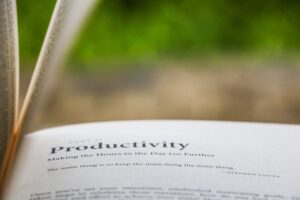x min read

“How To Spend Time Efficiently In School For High Schoolers”
Introduction
High School is a lot to handle. Loads of homework. Teachers assigning inhumane amounts of class work. Projects. Daunting periodical tests and quizzes. And don’t even get me started on the semester or end-of-year exams; those are the worst.
It just seems like your schedule is so packed. So packed to the point where you can’t focus your time and precious attention on anything else besides schoolwork. But is that really true?
The answer: no, it isn’t.
You can do a lot more than prioritize schoolwork 24/5 (unless you’re someone that loves school to the point where they’ll do it on the weekends too; which if that applies to you, then good for you).
But, that doesn’t mean that you aren’t good for anything else. You have time. So much time actually. You just don’t realize it.
Fun fact, you have more time right now than you’ll ever have in the next few years (if your plan is to go straight to college or straight for a job, of course); it’s just that your bad at handling all the time you have, so it feels short.
Realization
There are 5 days in a school week (depending on where you live); 5-9 hours (give or take) in a school day; and 24 hours in a day.
You likely spend a few hours working per day, but of course, not much. We’ll assign that variable an average of 2-4 hours.
And lastly, you spend 6-8 hours sleeping (or even less). Just saying, 8 hours is fairly generous considering that most students in their teenage years are barely scratching 5 hours of sleep per night. I know there’s close to any way that more than 5% of students are getting 7, let alone 8 hours of sleep. Be honest.
Now, let’s add ’em up.
6-9 hours in a school day + 2-4 hours working + 6-8 hours sleeping = 14-21 hours total
Based on that calculation, one thing is evident. You do have time available. A lot of it.
Chances are, you’re one of the more fortunate ones that gets to have less than 7 hours of school per day, works for a maximum of 2 hours, and sleeps close to the 6-hour mark. And yet, I set those at the bare minimum for this calculation. And by the looks of it, those of you who meets that exact criteria somehow have 10 hours available. Yeah, 10 whole hours to do anything they want.
And even if you aren’t as fortunate, you still have a good 3-5 hours. That’s a lot of time to go to waste, and a lot of time that can go towards good use.
My Point
There is so much time that you have available in the day and you’ll have been regretful in a few years when you work your 8 hours shifts and acknowledge how much time was at your disposal but how you willingly threw it all in the garbage, just for some stimulation.
Why Bother
I’ve said it a million times (just like a bunch of other people online that you’ve seen probably have), spending time productively is one of the most important things that you can do for yourself. You can choose to waste every hour that’s given to you, and never get it back; OR, you can choose to use every hour like it’s your last and be grateful in the future that that’s how you spent it.
The same idea applies towards the free time you have available from school. Sure, it seems worthless and pointless to use in the moment, but it’s much more than that. All time given is a gift. It’s a reward. It’s a priceless treasure that cannot be bought.
And you’ll go by your entire high school career, just to celebrate your 18th birthday, and realize: “wow, just where did all that time go?”
Maybe you’ll wish to have spent time off the screen, and have socialized, met more people, and build stronger connections, so that your future self can live an easier, more fulfilling life. And guess what? That’s apart of it too. Spending time off the screen towards things of other importance matters just as much. Fostering connections, building bonds, and finding meaning off digital technologies will save you. It’s your ticket to a good life. Don’t you want that?

“Ticket” Images – Unsplash.com
How To Spend Time Efficiently: In School
- Mastering Time Management: Your day at school is likely already structured, but that doesn’t mean you can’t optimize it. Utilizing every available moment, whether it’s a free period or a study hall, can make a significant difference. Instead of wasting those precious minutes, consider using them to tackle homework assignments or review for upcoming tests. Interestingly, a study conducted by the American Psychological Association revealed that students who actively plan their study time are less prone to anxiety. This underscores the importance of taking control of your schedule and using time wisely to alleviate academic stress.
- Prioritize Your Tasks: When faced with a load of assignments and obligations from various subjects, it’s essential to prioritize tasks effectively. One useful method for achieving this is the Eisenhower Box; a framework that helps you categorize tasks based on their urgency and importance. By employing this system, you can discern between tasks that demand immediate attention, such as preparing for tomorrow’s chemistry quiz, and those that can be deferred, such as working on an English essay due next week. Stephen Covey’s influential book, “The 7 Habits of Highly Effective People,” emphasizes the effectiveness of this approach in enhancing productivity and achieving goals.
- Efficient Note-Taking: Effective note-taking is a crucial skill that can significantly impact your academic performance. Adopting a structured note-taking method, such as the Cornell Note-Taking System, can enhance your ability to capture and retain key information during class lectures. This system encourages active listening, concise summarization, and organized note organization; all of which contribute to better comprehension and retention of material. Research supports the notion that organized notes can facilitate better recall and understanding of concepts, ultimately leading to improved academic outcomes.
Action Step
As a general guideline, be sure not to go too crazy with your notes during the school day, because that too can mess with your brain and start facilitating stress beyond what you would ever want. So, brief notes on the material discussed in class accompanied by another other important notices should serve you well enough.
- Participation Pays Off: Active participation in classroom discussions is more than just a way to earn participation points; it’s a valuable learning opportunity. Engaging in discussions allows you to verbalize your thoughts, clarify your understanding of concepts, and engage with peers in meaningful dialogue. Additionally, the act of listening to others’ perspectives can broaden your understanding of the subject matter. A study published in the International Journal of Teaching and Learning in Higher Education found that active participation positively correlates with enhanced understanding and retention of information. By actively participating in class discussions, you not only deepen your comprehension of the material but also reduce the amount of time needed for later study sessions.
How To Spend Time Efficiently: At Home
- Lean on Technology: Embracing technology can revolutionize your approach to time management and organization. Leveraging apps and digital tools can help you stay on top of assignments and deadlines, ensuring nothing slips through the cracks. Research published in the Journal of Educational Computing Research highlights the effectiveness of planning software in enhancing time management skills among students. By integrating these tools into your routine, you can streamline your workflow, reduce procrastination, and increase productivity.
- The Power of ‘No’: While extracurricular activities can enrich your high school experience, it’s crucial to strike a balance and avoid overcommitment. Saying ‘no’ to certain opportunities may seem daunting, but it’s essential for preserving your mental health and preventing burnout. A study featured in the Journal of Adolescence emphasizes the importance of quality over quantity when it comes to extracurricular involvement. By being selective and choosing activities that genuinely interest you and align with your long-term goals, you can maximize your impact and avoid spreading yourself too thin.
Action Step
Take inventory of your current extracurricular commitments and assess their alignment with your goals and interests. Identify any activities that may be causing undue stress or detracting from your overall well-being. Practice assertiveness by politely declining new commitments that do not align with your priorities. Remember that it’s okay to prioritize your mental health and focus on activities that bring you fulfillment and joy.
How To Spend Time Efficiently: At Home (cont.)
- Restorative Rest: In today’s fast-paced world, prioritizing sleep often takes a backseat to academic and extracurricular commitments. However, adequate sleep is essential for cognitive function, memory consolidation, and overall well-being. The National Sleep Foundation recommends 8 to 10 hours of sleep per night for teenagers; highlighting its critical role in academic success and physical health. By prioritizing restorative rest, you can optimize your cognitive abilities, enhance mood regulation, and bolster immune function; ultimately setting yourself up for success in all areas of life.
- Downtime is Essential: In the pursuit of academic excellence, it’s easy to overlook the importance of leisure and relaxation. However, research published in the American Journal of Health Promotion highlights the profound impact of leisure activities on stress reduction and mental health. Incorporating downtime into your schedule isn’t just indulgent; it’s essential for maintaining balance and preventing burnout. Whether it’s pursuing hobbies, spending time with loved ones, or simply unwinding with a good book, carving out space for leisure activities is crucial for your overall well-being.
- Reflect and Adjust: Achieving a harmonious balance between academic, extracurricular, and personal commitments is an ongoing process that requires periodic reflection and adjustment. Take time to evaluate your at-home routine and identify what’s working well and what could be improved. Flexibility is key to adapting to changing circumstances and refining your approach to time management and self-care. By regularly assessing your habits and making necessary adjustments, you can cultivate a balanced lifestyle that aligns with your unique needs and priorities.

“Work” Images – Unsplash.com
Conclusion
Spending time productively is a smart thing to do. So, start doing it. You’ll be reward immensely and you’ll see (soon enough) that time is a precious gift that must be spent wisely with as much care and devotion as possible to ensure that the most is made with it.



